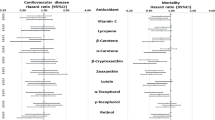Abstract
In a prospective study of 5,004 women in Guernsey, plasma samples were collected and stored. Retinol, beta-carotene and vitamin E levels were later measured in the samples from 39 women who subsequently developed breast cancer and from 78 controls who did not develop cancer. Plasma retinol levels were not related to the risk of breast cancer, mean levels among cases and controls being 485 micrograms l-1 and 479 micrograms l-1 respectively. Plasma vitamin E levels showed a clear association, low levels being associated with a significantly higher risk of cancer. The mean vitamin E levels among cases and controls were 4.7 mg l-1 and 6.0 mg l-1 respectively (P less than 0.025), and the risk of breast cancer in women with vitamin E levels in the lowest quintile was about 5-times higher than the risk for women with levels in the highest quintile (P less than 0.01). beta-carotene levels showed a tendency to be lower in women who developed cancer than in controls (36 micrograms l-1 among cases compared with 50 micrograms l-1 among controls) but the difference was not statistically significant.
Similar content being viewed by others
Rights and permissions
About this article
Cite this article
Wald, N., Boreham, J., Hayward, J. et al. Plasma retinol, β-carotene and vitamin E levels in relation to the future risk of breast cancer. Br J Cancer 49, 321–324 (1984). https://doi.org/10.1038/bjc.1984.50
Issue Date:
DOI: https://doi.org/10.1038/bjc.1984.50
- Springer Nature Limited
This article is cited by
-
Antioxidants and breast cancer risk- a population-based case-control study in Canada
BMC Cancer (2011)
-
Plasma carotenoids, tocopherols, retinol and breast cancer risk: results from the Shanghai Women Health Study (SWHS)
Breast Cancer Research and Treatment (2009)
-
No evidence of association between breast cancer risk and dietary carotenoids, retinols, vitamin C and tocopherols in Southwestern Hispanic and non-Hispanic White women
Breast Cancer Research and Treatment (2009)
-
Terpenoids and breast cancer chemoprevention
Breast Cancer Research and Treatment (2009)
-
Breast cancer in developing population: A nutrition caveat
Indian Journal of Clinical Biochemistry (2001)




